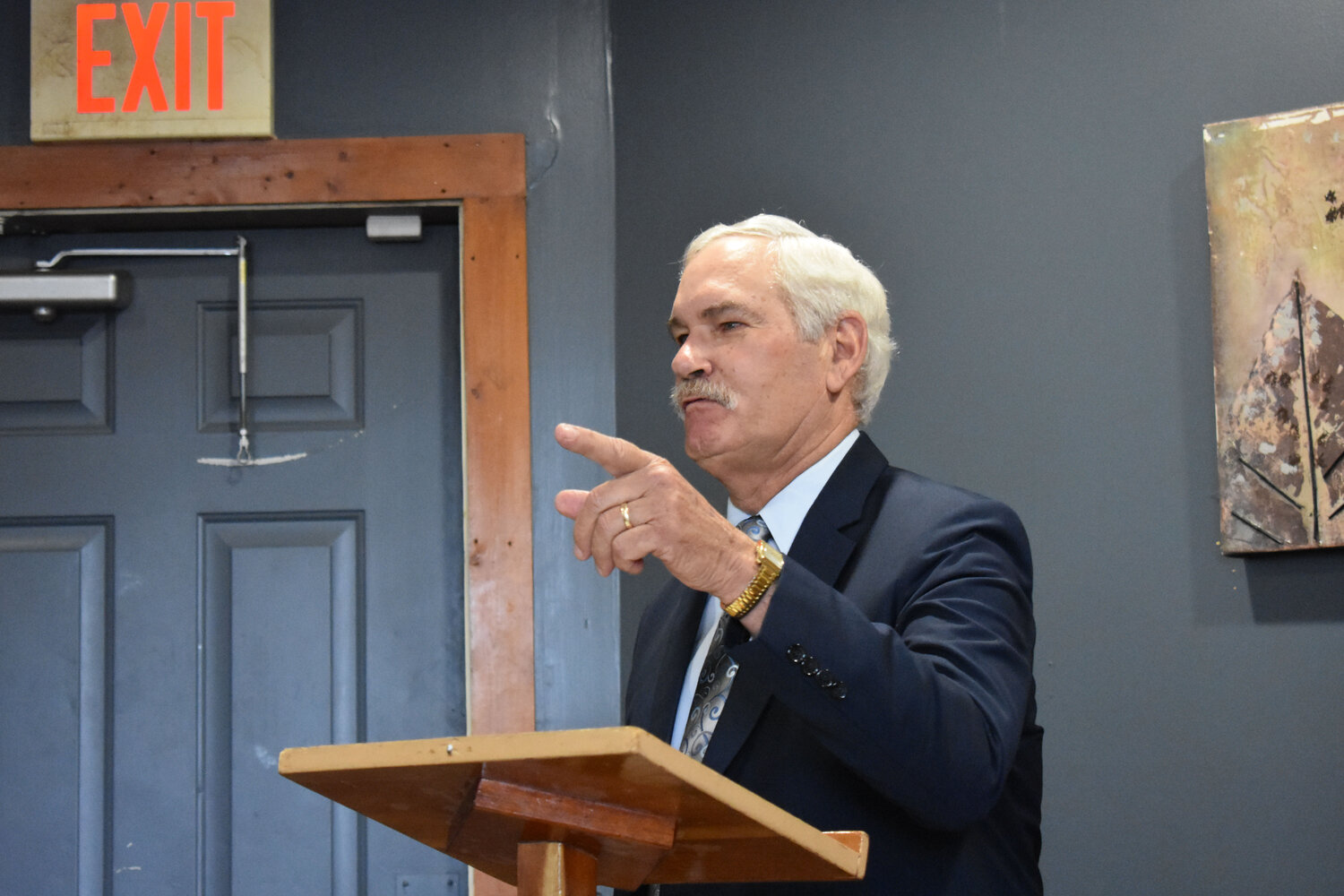Delaware agriculture secretary promotes industry at chamber luncheon in Fruitland
FRUITLAND — Delaware Secretary of Agriculture Michael T. Scuse touted the importance of agriculture to the Delmarva peninsula during a recent chamber luncheon at Adams Taphouse in Fruitland.
…

You must be a member to read this story.
Join our family of readers for as little as $5 per month and support local, unbiased journalism.
Already a member? Log in to continue. Otherwise, follow the link below to join.
Please log in to continue |
Delaware agriculture secretary promotes industry at chamber luncheon in Fruitland
FRUITLAND — Delaware Secretary of Agriculture Michael T. Scuse touted the importance of agriculture to the Delmarva peninsula during a recent chamber luncheon at Adams Taphouse in Fruitland.
Scuse touched on various agricultural topics affecting the region — a need for land preservation and teaching the next generation about farming — while noting recent successes, including a successful collaboration between Delaware and Maryland officials and the use of technology in the industry.
The May event with members of the Salisbury Area Chamber of Commerce comes eight months before Scuse is slated to retire from office after decades of service at the state and federal levels.
According to Scuse, Delaware’s agricultural industry employs 75,000 people and generates $13 billion in economic activity for the First State.
“The farmers produce — just like here on the Eastern Shore of Maryland — corn, soybeans, wheat, poultry, dairy, fruits, vegetables and nursery stock on 522,000 acres,” Scuse said.
Scuse noted that more than 95 percent of Delaware’s farms are family-owned — comparing favorably to Maryland’s — and more than half of the farms are smaller than 50 acres in size.
But he also warned that Delmarva is becoming a popular destination for those moving from other states, saying that its biggest natural resource needs to be protected through “smart” growth, so farmland does not disappear in the future.
“Our location in the Chesapeake Bay places a lot of importance on conservation, from protecting agriculture land, increasing the adaptation of conservational practices and supporting farm viability in the next generation of agriculture and new and diverse small farmers,” Scuse said.
Agritourism is becoming a popular way for farms worldwide to introduce farming to the next generation, and Scuse said that is no different on the Delmarva peninsula. He said by visiting a working farm, the public can learn where their meals come from.
“If 2020 was anything, it showed people where their food came from,” Scuse said. “It’s the first time in this nation that people walked into a grocery store and there wasn’t food on the shelves. People started realizing how important agriculture plays in keeping those food shelves full.
“Kids learned for the first time that food did not come from Walmart down the street. It came from a farm. Agritourism is a great way for us to educate that.”
Scuse said when you compare Delaware and Maryland in terms of agriculture, differences can be seen in terms of size, geography, crops, livestock grown and the political arena.
“However, regardless of those differences, and even with the recent change in Maryland’s administration, our states maintain a very, very close relationship,” Scuse said. "And what makes this relationship so unique, is this peninsula we are all on. The map shows the state lines, but trust me, when the (state agriculture departments) are together, there are no state lines. We work together as one.”
Scuse said the poultry industry crisscrosses Delmarva with growers and processing plants. He said that successfully fighting off outbreaks of Avian Influenza in 2004 and 2002 was due to a successful collaboration between the states.
He additionally said Delaware and Maryland producers rank at the top of the nation in using the most modern technology in the industry.
“I know years ago John Deere said if they were going to have any new equipment, it was going to be brought to Delmarva first, because our producers here would adapt to it and use it before anybody else in the country,” Scuse said. “I think that still holds true today.”
But Scuse warned that a popular technology centered around energy could be a hindrance to local farmers — solar farms.
“In my opinion, that is one of the worst things to ever happen to farmland,” Scuse said. “Second only to maybe development. “
He proposed putting them instead in the parking lots of shopping malls or grocery stores.
“We don’t have a limitless acreage of farmland,” Scuse said. “We’re losing enough to development. We don’t need to lose it to solar farms as well.”
Scuse also said he plans to continue working with Maryland agriculture officials before his time in office is up.
“I’ve got eight months left before I’m going to retire, and I look forward to working with Secretary Atticks and his team because they are truly doing a wonderful job.”
Reach Managing Editor Richard Caines at rcaines@iniusa.org.


 By
By 



